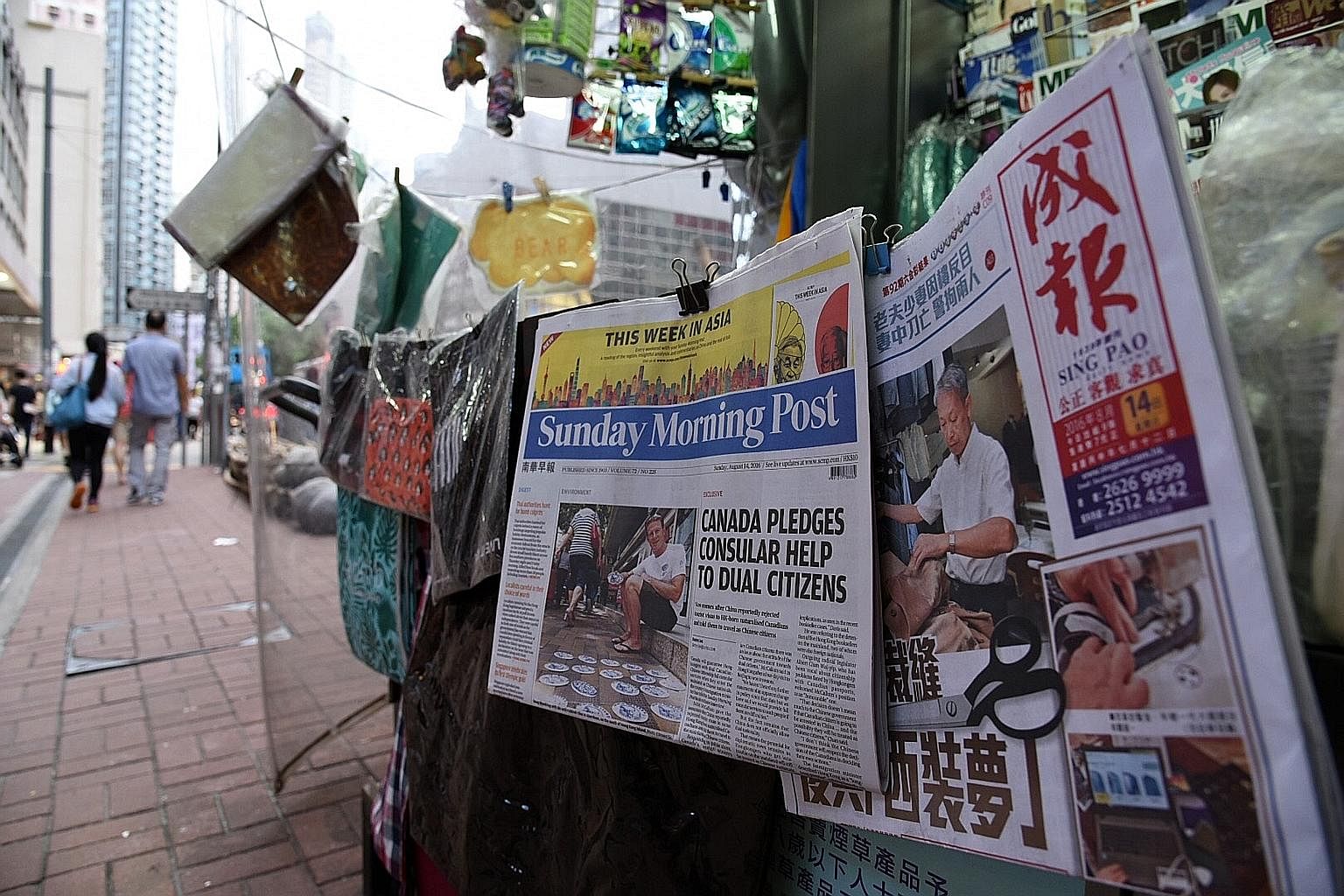At the beginning of this month, Media Chinese International, which publishes Ming Pao Daily News, sold 73.01 per cent of its shares in its subsidiary media arm that runs the Hong Kong newspaper to a Chinese state-owned firm.
On the same day, on Aug 1, the Hong Kong Economic Journal (HKEJ) suspended a popular column by veteran columnist Joseph Lian Yi Zheng, a known critic of the the central government and Hong Kong leader Leung Chun Ying's administration.
Critics have questioned the timing of the two developments in the Hong Kong media sector, coming just a month before the city's legislative elections on Sept 4.
It is a sign that Beijing is seeking ideological control over the city, said analysts, who also noted that Beijing had managed to block pro-independence activists from getting into the Legislative Council (Legco) with a controversial new rule. Many believe that the new rule - which requires candidates to declare Hong Kong as an "inalienable part" of China - was an order from Beijing.
The acquisition of Ming Pao, meanwhile, further marked Beijing's foray into the Hong Kong media sector, which China sees as an important factor to influence the election outcome, said analysts.
Just eight months ago, China e-commerce giant Alibaba paid HK$2.06 billion (S$360 million) to acquire the media assets of SCMP Group, including the city's mainstream English-language daily South China Morning Post.

"They have been doing the same thing for quite some time. They have resorted to different ways - through co-opting, acquisitions, befriending and intimidation of Hong Kong media firms," says Professor Joseph Chan, emeritus professor of journalism and communication at the Chinese University of Hong Kong (CUHK).
Prof Chan says the progression from physical attacks on journalists in 2014 to self-censorship by editors, and then to the acquisition of Hong Kong media firms faced with financial woes, shows Beijing's attempts to tighten its grip over Hong Kong's media, which are not new.
Acquisition might have started out as an economic move, but the political implications that it holds are also evident in self-censorship by publications that rely on Chinese capital funds, said Prof Chan.
Although Alibaba executive chairman Jack Ma has promised that the firm's management would not take part in SCMP newsroom operations, critics say it is still too early to tell, with some saying that the paper has seemed more cautious in reporting China news.
Like the SCMP, Ming Pao and HKEJ are regarded as highly credible publications by Hong Kongers and academics.
The owner of HKEJ is Mr Richard Li, whose father Li Ka Shing has sizeable investments in the Chinese mainland. Some critics suggest that the daily could have felt political pressure from mainland authorities to practise self-censorship, leading to the recent termination of Dr Lian's column.
The Li family's flagship company, C.K. Hutchison, generated 14 per cent of its earnings before interest and taxes from China, where it operates about 2,500 Watsons and ParknShop stores, according to a Bloomberg report in June.
Its real estate unit, Cheung Kong Property, counts about half its revenue from the mainland and has dozens of huge properties there.
In a farewell piece that was published online, Dr Lian, who was once HKEJ's chief editor, said he understood the "tremendous pressure" faced by the daily when it published his commentaries, which "always strayed from the official line".
It is widely believed that his column was axed after he angered Beijing by expressing sympathy towards Hong Kong activists who advocate breaking away from China. "He (Dr Lian) is not an advocate of independence but he has apparently crossed the red line and stumbled into this taboo area," says Dr Willy Lam, an adjunct professor at CUHK.
In 2014, former Ming Pao chief editor Kevin Lau Chun To was seriously hurt in a brutal knife attack after his dismissal from the paper triggered protests about press freedom in the city. It was believed that the attack was payback for Mr Lau's decision to pursue investigative reports on the offshore assets of Chinese leaders.
Critics have also linked last year's case involving five missing Causeway Bay booksellers to Beijing's attempts to find out who supplied the content for the politically sensitive books that were published and sold by the bookstore, at a time when Chinese President Xi Jinping was working to cement his power.
Since Hong Kong returned to Chinese rule in 1997, there have been fears that Beijing would try to suppress press freedom in the city, says Prof Chan.
But it was not until 2003, when half a million people protested against a controversial national security legislation - Article 23 - that the central government took a serious stand and went on to tighten its grip on the city's media.
"Beijing thought that Hong Kongers might have gone too far. In their evaluation, they found that the media might have been a platform for social mobilisation. Hence, they want to tighten up the control of Hong Kong in general, and the media in particular," Prof Chan tells The Straits Times.
He says: "In their ideological system, the central government finds the media to be very important, that's why it is tightly controlled in China. In words, they may guarantee Hong Kong press freedom, but they have bottom lines and a different system."

